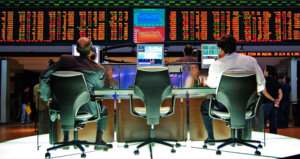Trading 212 hits the headlines with no-commission physical equities – but who is booking the trades? We investigate
As Trading 212 launches deliverable equities with zero commission to a wave of tumultuous speculation as to how this can actually be priced and offered, FinanceFeeds makes an incisive investigation and speaks with those concerned, the speculators and the company itself

Speculation is an easily stirred emotive response to a newly introduced asset class or method of trading by a retail brokerage these days, largely due to the very important focus on value proposition that blights many smaller retail firms as well as the need to continue to explore diversification of instruments whilst keeping pace with the demand for a low cost trading environment.
On Thursday last week, Bulgarian retail FX broekrage Trading 212 generated a stir in London, hot on the heels of the launch of its physically deliverable equities product range.
In this particular circumstance, the launch of physically delivered equities is not necessarily the reason for metaphorical curtain-twitching across the world’s largest financial center, but rather the means by which the terms are provided to retail traders.
As last week drew to a close, mainstream news outlets across London generated reports which were peppered with superlatives about Trading 212’s new service. One such report stated that “for the first time in the UK’s history, anyone wanting to dabble in shares can trade away without having to pay commission as Trading 212 launches its share trading platform today.”
Ordinarily, such a claim by the uninitiated would immediately result in those with seasoned industry experience moving on with their day, convinced that this was a marketing-led claim by a little known warehouse brokerage which could afford to make such claims on the basis that it has no intention of transferring the trades to a live market, and would instead warehouse them and profit from customer losses.
In this case, however, this would not be possible, as there is absolutely no way of taking all the risk and operating a b-book when the end product is physically deliverable at genuine market value and has been provided by the live equities market.
The overt marketing strategy is bold indeed, especially within the company’s online advertisement which will soon be available on YouTube to a retail audience globally. It features portly, middle aged and well dressed ‘brokers’ bathing in gold before being pelted with Trading 212’s shiny silver ‘zero commission’ coins.
Indeed, this type of advertising can be regarded as extremely garish by British standards, and is not something that the authorities relish either. Indeed, in Britain, discretion is the better part of valor and the Advertising Standards Agency has shown its distaste for such vulgarity recently, however on YouTube, no borders means no boundaries.
Speaking to several executives in London this morning, FinanceFeeds gained a first hand insight into the speculation that something is awry.
“There is chatter here in the City that they’re padding the spreads. Their homepage shows Amazon trading at a $2.80 spread whereas other UK brokers have it as $1 for the physical” said one trader in the City.
Another industry insider explained on Friday “I am referring to the fact that Lloyds as an example has a two way spread of 11 ticks on their platform and with some element of two way trading they are actually taking 16.47 bps per execution (based on 11 ticks against the current mid of 66.725) – For clarity the FCA allow an authorised firm to take an explicit commission or a turn in the price. No broker can take/charge both without showing that clearly on a contract note or trade notification.”
The reality is that there are a lot of unanswered questions as to who is booking the trades, therefore FinanceFeeds spoke to Trading 212 in order to gain clarity on this matter.

When approached and asked how the product can be delivered with zero commission, and if there is a spread mark up, Trading 212’s spokesperson sadi “We are working with various established partners.”
Upon further dissection, the firm explained to FinanceFeeds that the firm is booking its trades for the physical delivery of equities through Interactive Brokers.
The spokesperson declined to provide any information about any spread markups, however, stating “I am not obliged to share such information.”
“Zero commission stock trading is possible because of our partners and the Direct market access type of offer they are supporting” was the corporate response.
This is an anomaly, as direct market access is absolutely necessary for the physical delivery of any asset class, however it is not commercially viable for providers to give a feed to a broker with no commission and no mark up, hence we continued to probe.
When further investigating, we were provded with a closure of conversation “I do understand the question and the concept, Andrey. However, I as a employee am not obliged to answer that. Thank you for your interest.”
FinanceFeeds was unable to clarify with Interactive Brokers what the terms of this are, however if it can be taken on face value that the feed is being taken from Interactive Brokers, it is worth considering that Interactive Brokers does not have a dedicated institutional feed and provides the same pricing to all participants, which is region specific.
Looking at the rates, the company does charge a commission for processing all trades, as is normal procedure and can be viewed by clicking here.
The spokesperson for Trading 212 signed off “As far as I am certified I may tell you that the new equity trading we are offering is unique and a really good opportunity to not spill over unnecessary funds to middle-man institutions.”
This is a very interesting situation and would be less newsworthy if it was not for the stir it has created across London, the company having an FCA regulated entity with Nick Saunders at the helm since 2014 as CEO of Avus Capital / Trading 212 in London.
Cambridge educated Mr. Saunders, who was Head of International Operations at IG Group from May 2011 until June 2011 before becoming Compliance officer and MLRO at Cave & Sons in Northampton, England, has a substantial career pedigree in this industry and is of high repute indeed.
“At this stage, I can’t tell you which entities we use for execution and post trade as we see this is commercially sensitive” Mr Saunders explained to FinanceFeeds this morning.
“I can however tell you that there is no smoke and mirrors. Trades in physical equities are traded either on the incumbent exchange (e.g LSE) or an MTF such as BATS. There is no spread mark up; trades are still subject to best execution requirements so we would be breaking FCA rules if there was. For smaller trades, we pay the minimal execution costs. Up to point it’s a marketing tool, but one that does offer genuine benefits. We estimate the actual execution costs of a trade at about £1; seen in that light, 10 free trades a month is not a massive cost, but does make you question how the more established brokers get away with such a mark up.” – Nick Saunders, CEO, Avus Capital / Trading 212
Mr. Saunders then clarified that there is no internalization, which makes sense given that this is a physical delivery, but also insists that there is no mark up on spread “Categorically there is no B-booking, there is no mark-up. Clients get the on-exchange price or better” he said.
With regard to the observation on the Amazon stocks which had been made by a pundit in London, Mr Saunders stated “I’m not sure how you saw Amazon at $2.80. It should be around $1000. What sort of time was it? It is possible that post market or pre-market residual bids / offers were left on the exchange order book. As with any other broker, we transmit the exchange price with no intervention.”
Disruption and putting the cat among the pigeons is part and parcel of the evolution of the FinTech and electronic trading businesses, especially in the retail sector, and this is a discussion that is an absolute case in point.









